The importance of attending Board of Visitors meetings:
By Cody Bartmann and The Cadet staff | The VMI Cadet
The Cadet Editor’s note: Over this past year, the number of questions within the Corps and alumni regarding the authority, responsibility and other aspects of the Board of Visitors (BOV) increased. This article is the first in a planned series to explore and explain the BOV and its relationship to the Institute and the Corps not only to address some of these questions, but also empower the Corps with the knowledge needed to approach and engage the BOV to become a true part of its activities.
There are a number of questions within the Corps and alumni regarding the authority, responsibility and other aspects of the Board of Visitors (BOV). This article is the first in a planned series to explore and explain the BOV and its relationship to the Institute and the Corps.
This one covers the potential impact of politics on the BOV and the Board’s trend to reducing transparency and free speech.
In terms of the Board of Visitors’ (BOV) composition and how members are appointed, the Virginia Military Institute (VMI) BOV website states,
“The Board has 16 members, appointed by the governor of Virginia and subject to confirmation by the Virginia General Assembly. Of those members, four must be non-alumni, and 12 must be alumni. The four non-alumni must be residents of the Commonwealth. Four of the 12 alumni will be non-residents of the Commonwealth…A regular term of membership is four years”. Members can be re-appointed for a second four-year term.
While future articles in this series plan to explore each BOV Committee and more detail on the Board operations and actions, the most basic question often-asked by cadets and alumni is, “What is the BOV responsible for?”
In short, according to its by-laws, The Virginia Military Institute (VMI) Board of Visitors (BOV) “is ultimately responsible for the academic quality and integrity of the Institute.” It defines VMI’s mission and executes total governance of all aspects of the Institute’s operations from the strategic plan to budget oversight.
The BOV sets the tuition, mandatory fees, and other charges cadets pay. They must approve VMI’s budget request to the Governor. The Board appoints the Superintendent and defines the goals and expectations for the Superintendent to meet. As the steadily increasing number of lawsuits filed show, the BOV is a named plaintiff in litigation against VMI due to these responsibilities.
What sets the VMI BOV apart from similar Boards for all other Virginia public colleges and universities is found in § 23.1-2500., C.
“The Institute shall be grounded in a strict code of honor and high academics, shall uphold a strict military structure, and shall remain solely an undergraduate degree-granting institution of higher education. All cadets shall participate in one of the Reserve Officers’ Training Corps (ROTC) programs at all times while attending the Institute.”
In short, if there are failures to any portion of the VMI experience or any changes to the Honor system, the BOV, not the administration, is ultimately responsible.
Another common question is, “Who does the BOV work for?”
A misconception is that the BOV works for the Superintendent (i.e. the Institute). The correct answer is in the recent Virginia Attorney General Jason Miyares’ opinion, previously covered in The Cadet,
“that a board of visitors, through its service to a particular institution, ultimately serves the Commonwealth is reflected in how they otherwise are treated under law. Corporate status does not alter each institution’s essential nature as a state agency that constitutes ‘an arm of the Commonwealth.'” [emphasis added].
It clearly establishes the Corps as the ultimate “customers” for the VMI experience, that the Institute exists “to provide education to the students…” [emphasis added].
From the perspective of the Corps, the parents who pay tuition, and Virginia’s taxpayers, the BOV works for them.
While the structure, responsibilities, and who the BOV serves, are simple and straight-forward, the increasing number of controversies involving the BOV raise more complex issues. Recent incidents involve VMI administrators working with the media and others against critics of their agendas.
While the nature of the BOV process placing political appointees on the Board has always been a factor, Governor Youngkin’s appointees now have a majority of BOV positions, and yet many of the policies and changes started under the previous administration continue.
—The Institute’s debt is increasing.
—The recent BOV debates on admissions standards, Inclusive Excellence, fiscal management, and other areas identify that the administration ignores or does not fully implement a number of the Governor’s policies and are not always responsive to the BOV Member requests.
—There is an increasing lack of transparency for Institute and BOV operations; more and more changes to the Ratline, Corps system, and the Honor System.
While it may appear simple that a majority of one group’s seats on the BOV should eliminate those issues, the reason that is not occurring is more complex.
The BOV President holds the most powerful position on the Board, controlling everything from Committee appointments to the Board’s meeting agenda. Governor McAuliff (D) appointed the current BOV President, Mr. Tom Watjen, ’76 in 2017 and his term does not expire until 2025.
The BOV elects its president annually and Mr. Watjen was re-elected in the previous May election, before the current Governor’s appointees gained a majority on the Board. Overall, Governor’s appointees hold a 9 to 7 majority (56%) but the minority party president runs the majority party dominated Board.
As of the January 2024 meetings, Governor Youngkin’s appointees chair only 2 of the 9 BOV committees (22%). On the powerful Executive Committee (ExCom) that approves or disapproves Nominating and Governance, as well as all other Committee recommendations, and determines what goes before the full BOV, Youngkin appointees hold only 1 of 4 positions or 25% of the votes. The ExCom receives BOV and other governance recommendations from the Nominating and Governance Committee where Youngkin appointees hold only 2 of 6 seats (33%).
The nominating committee controls nominations for the BOV President, Vice Presidents, and Secretary to the Board. They review the committee structure of the Board and other governance issues including by-laws changes. They also “assist the Alumni Association in support of the recommendation of highly qualified individuals for appointment to the Board of Visitors”.
While Youngkin appointees do hold 5 of 8 seats (63%) the Board’s largest committee, Inclusive Excellence, the Chair running its activities was appointed by Former-Governor Ralph Northam who replaced Gen. Peay with Maj. Gen. Wins as Superintendent.
Maj. Gen. Wins and Governor Northam’s Attorney General replaced VMI’s previous legal Counsel under Gen. Peay’s administration with Mr. Patrick O’Leary ’90. He is responsible to advise the entire BOV in looking out for the best interest of the Commonwealth.
A BOV member noted during a recent Executive Committee (ExCom) that the Superintendent’s proposed transgender policy he participated in developing and supported did not follow the Governor’s guidelines. The same BOV member pointed out that Mr. O’Leary never consulted the Attorney General’s Office before rendering a legal opinion VMI should approve that policy.
During the January Meetings a separate representative from the Attorney General’s Office briefed some BOV members on the Governor’s transgender policy in closed session. Recently Mr. O’Leary was one of the lead attorneys in a civil case where the Rockbridge County Circuit Court sanctioned VMI and the BOV for providing false or misleading representations.
Much of this activity occurred out of the public eye until some members of the VMI Family began recording and publicly posting BOV ExCom sessions to increase public visibility of BOV operations and decisions.
In its most recent January, 2024 meeting, however, the BOV appears to be moving towards limiting, redacting or otherwise censoring public visibility of and comments for BOV Meetings.
According to Virginia statute at § 2.2-3707 the public must be allowed to attend all open BOV sessions and may record them by any means. Any votes or actions taken during a lawfully closed session must take place in a public session that follows.
At least one copy of the proposed agenda, all agenda packets, and all non-exempt materials furnished to BOV members shall be made available for public inspection at the same time such documents are furnished to the members of the BOV.
Last year the BOV took a step to reduce public comment by changing their policy from allowing members of the public 3-minute in-person “public comment” slots during BOV meeting to only allowing these presentations of views once every year. Written comments can be submitted. They are available by contacting the VMI BOV Secretary.
The BOV routinely does not record or live-stream its important ExCom meetings. After The Cadet raised this issue, some were live-streamed and members of the public began recording and publishing videos of these meetings on their own initiative.
Had they not done so, important controversies such as
- VMI’s working with the media to challenge the integrity of its own Cadets and The Cadet itself;
- a proposed transgender policy, developed without significant Corps input and its compliance with Governor Youngkin’s model guidelines; and
- serious budget issues impacting Cadet tuition and fees
likely would have remained secret.
Not all members of the BOV and VMI leadership appear to be embracing this new level of transparency. At the recent Jan. 25th ExCom, hard copies of the required material were not available to members of the public attending the session and VMI’s attorney questioned one attendee exercising his right to record the meeting.
VMI’s assistant Attorney General representative, Mr. Patrick O’Leary, was overheard confronting a member of the local Lexington community who was recording the public session.
According to the report, later confirmed with the member of the public involved, Mr. O’Leary approached him before the meeting started to ask why he was there, why he was recording the meeting, who he was recording the meeting for, and if he was getting paid to record the meeting. After BOV President Tom Watjen ’76 announced the ExCom was moving to closed session, Mr. O’Leary quickly turned to that same member of the public to abruptly state, “you’re done!”
Although Virginia statute requires the public be allowed to remain and return to the room for all required votes and other actions that must occur in public after the closed session, attendees report they’ve never been advised of this when dismissed before the ExCom or BOV go into closed session.
During the ExCom meeting itself, BOV member Ms. Gussie Lord ’01 expressed her discomfort over the language in some of the written public comments submitted to the BOV. A discussion followed concerning how the BOV, working with the administration, plans to explore further restrictions on public comments.
Ms. Lord told the ExCom that “some of the public comments we get are great and thoughtful and whatever…. some of the comments are a little bit abusive. I think we’ve seen one recently targeting specific employees that work here based on who they are…”
The BOV President, Mr. Tom Watjen ’76 opined that the Board may just want to continue ignoring critical public comments, stating, “sometimes when you react to it, it actually gives it some credibility. That’s what I worry about sometimes.”
VMI superintendent Maj. Gen. Wins then reminded the group of his comments the previous year that a toxic environment is created at VMI by critical public comments and it affects the overall workforce. He plans to work with Col. Bill Wyatt, VMI’s former Communications Director and now his Executive Officer, to “figure out in terms of what state law says about public comments, whether or not there’s something that we can do about those that have a very, very hostile, negative, toxic effect.”
Options Maj. Gen. Wins presented to address the situation included possibly redacting and forewarning members of the public “if you send something in here that’s targeted, toxic, those types of things, it won’t be posted.”
BOV Member Mr. Gottwald offered a more measured approach, “I like the idea of putting something in there when you put it out, ‘Hey, be civil and be respectful,’ and if nothing else, people are going to probably read it. If you’re civil about it, if you’re not, then nobody’s going to pay attention to it. I don’t think having somebody decide that’s too ugly post it is the way to go. We’ve all heard worse…”
After locating and reviewing of the public comments posted for the BOV session that initiated Ms. Lord’s comments, some of which were copied to the editors when submitted, The Cadet found three public comments submitted by Mr. Jake Spivey ‘85, one from Mr. Irwin McCumber ’65 and one from Mr. Mike Staso ’79 .
Mr. Spivey’s comments addressed the topics of VMI’s NCAA program, proposing “The Board of Visitors needs to undertake a comprehensive, whole-of-VMI assessment of the athletic program, classifying “the administration’s current sales pitch ‘we need more money’ to be successful, ‘to compete to win’, is short-sighted.”
Mr. Spivey’s second issue asked the BOV to publicly explain how VMI and the VMI Foundation are achieving the statutory requirements enacted in the 2021 “Enslaved Ancestors College Access Scholarship and Memorial Program” from the Virginia General Assembly. He called on the BOV to publish the results of the Inspector General’s investigations into the actions by members of the VMI administration to discredit cadets, The Cadet newspaper, and their Virginia Press Association (VPA) awards.
Mr. Spivey wrote, “The Board of Visitors fails the Corps of Cadets, Alumni, and citizens of the Commonwealth when it does not uphold ‘the integrity of the Institute’ by permitting the administration to not hold staff accountable for improper conduct.”
Mr. Spivey concluded by re-stating this position VMI needs a long-term investment in a professional communications and marketing company as well as ending its fight against The Cadet’s independence and recognition. His two additional supplements included detailed, factual supporting documentation.
Mr. Staso’s public comments echoed Mr. Spivey’s concerns regarding the alleged Inspector General (IG) investigation of VMI’s actions against The Cadet, its VPA awards, and the cadets and alumni impacted. He also raised similar issues to Mr. Spivey’s regarding the lack of disciplinary actions and secrecy involving members of the administration involved that included questioning Col. Wyatt’s role in the controversy as well as his promotion to Executive Officer to the Superintendent and apparent subsequent substantial pay increase. Mr. Staso’s submission contained extensive links to external supporting information and was highly critical of both the secrecy of VMI’s alleged investigation report and the BOV’s continued silence.
Mr. McCumber’s comments expressed concern about “the entire ‘DEI’ program at VMI”, opining, “I view it as divisive and totally unnecessary – a waste of hard to come by resources. The Rat Line is the greatest leveler of the playing field I have encountered in my 80 years, and provides an excellent opportunity for all cadets to proceed on their own merit. It is time proven!” He submitted an article from the STARRs website, an organization of military officers who oppose DEI.
In one other measure, a BOV agenda item appeared proposing a significant by-laws change to empower the BOV President, and Superintendent, to recuse any BOV member from involvement on any topic. According to that change,
“This obligation also extends to those matters that might give rise to the appearance of a conflict or other impropriety.” [emphasis added].
This included “personal” relationships that “potentially could be construed to affect their independent, unbiased judgment in light of their decision-making authority and responsibility” [emphasis added].
The recusal would cover “any personal or business contacts they may have with an adverse party in any potential or pending litigation against VMI” and any relationships, including personal, that could be “perceived as a conflict of interest.” [emphasis added]
The Board President (Mr. Watjen) “with the assistance of the VMI General Counsel [Mr. O’Leary]” would be the sole authority making the determination “as to whether a perceived or actual conflict of interest exists.”
Once the BOV President made the subjective determination a conflict exists, the impacted Board member would be recused for any involvement “unless the Board or administration requests information or interpretation for special reasons” [emphasis added].
Although the proposal was not put to a vote and is pending further discussion, had such rules been in effect previously, they could have been used to block the inquiries raised by some BOV members regarding the administration’s actions in regard to The Cadet and other issues.
As previously reported in The Cadet, Maj. Gen. Wins presented to attendees at Governor Youngkin’s Freedom of Speech Summit that at VMI cadets have an “obligation” to speak out about things,” and he urged members of the VMI community to “Speak truth to power.” The Cadet will continue to monitor and report on the results of the BOV and administration’s planned efforts to limit public comments.
In addition to its continuing series on the BOV responsibilities and activities, The Cadet is instituting an “Ask the BOV” program. All cadets will be able to pose questions to the BOV on topics of concern and publish the responses, or lack thereof, in order to allow every member of the Corps to question their BOV using this link: https://www.surveymonkey.com/r/VMIBOV
Attachments
Irwin McCumber ’65.pdf
Jake Spivey ’85.pdf
Mike Staso ’79.pdf
O’Leary_Authority.pdf
Spivey_85_sup_1.pdf
Spivey_85_sup_2.pdf
One of the statements to the VMI BOV. Doesn’t sound “toxic” at all:
Ladies and Gentlemen –
I am writing today to communicate my concern about the entire “DEI” program at VMI. I don’t really care what names you might want to call it – I am against it in all its forms and would like to see it eliminated in its entirety from the Institute. I view it as divisive and totally unnecessary – a waste of hard to come by resources. The Rat Line is the greatest leveler of the playing field I have encountered in my 80 years, and provides an excellent opportunity for all cadets to proceed on their own merit. It is time proven!
Along this line, I also do not want to see VMI wasting any resources dealing with the transgender nonsense. It is just completely ridiculous and should have no place at VMI.
I am attaching a link to an article (Yet another liberal WAKES UP to what DEI really is | STARRS) published on the STARRS website. Perhaps you are familiar with STARRS – an organization of military officers who are trying to stop the destructive results of incorporating the DEI methodology into our military. This article addressing DEI, was written by Bill Ackman who is a very well known graduate of Harvard. His article is comprehensive and I hope you will take the time to read it, including the comments at the conclusion.
VMI promotes itself as “No Ordinary College”, and endeavors to produce honorable leaders for our country’s future. Real leaders do not take the easy road and just go along with the flow. Sometimes it is necessary to stand up for what is right, and oppose what is wrong. As a graduate of the Institute, I would like to see more real leadership exhibited, and I know I am far from alone in this feeling.
I respectfully submit these comments, and thank each of you for all you do for the Institute.
Irwin McCumber ’65

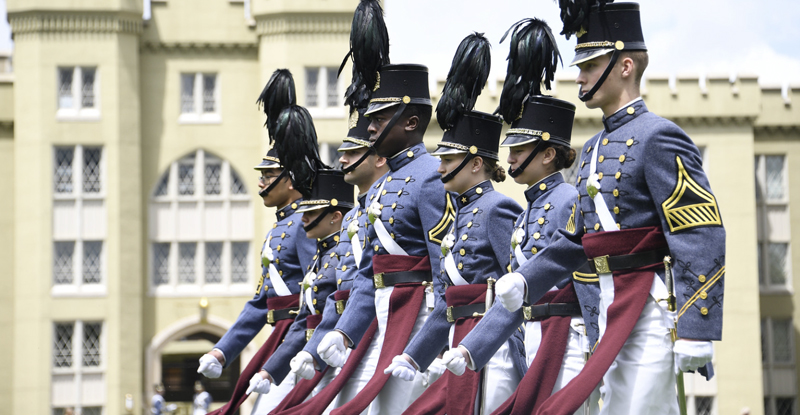
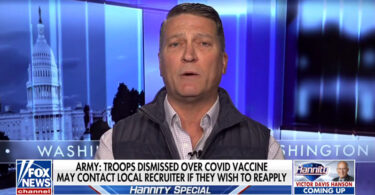
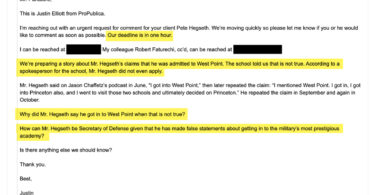
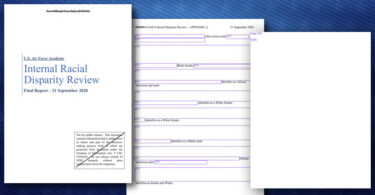
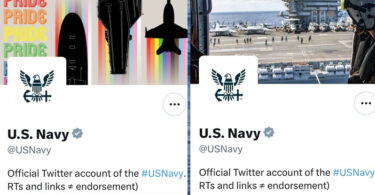


Leave a Comment